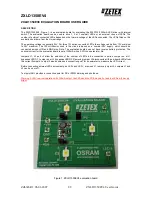
Vig395P Motherboard Manual
127
Internet Streaming SIMD Extensions
Consists of 70 instructions and includes single instruction, multiple data for floating-
point, additional SIMD-integer and cache ability control instructions. Benefits include
higher resolution image viewing and manipulation, high quality audio, MPEG2 video,
and simultaneous MPEG2 encoding and decoding, reduced CPU utilisation for speech
recognition, and higher accuracy and faster response times
L.E.D.
Light Emitting Diode - a light which indicates activity - for example hard disk access.
PCI (Peripheral Component Interconnect)
Developed by Intel, PCI is a local bus standard. A bus is a channel used to transfer
data to (input) and from (output) a computer and to or from a peripheral device. Most
PCs have a PCI bus usually implemented at 32-bits providing a 33 MHz clock speed
with a throughput rate of 133 MBps.
NetBurst® micro-architecture (Intel NetBurst® micro-architecture)
The NetBurst® micro-architecture delivers a number of new and innovative features
including Hyper Pipelined Technology, 400 MHz System Bus, Execution Trace Cache,
and Rapid Execution Engine. It also delivers a number of enhanced features, including
Advanced Transfer Cache, Advanced Dynamic Execution, Enhanced Floating Point
and Multimedia Unit, and Streaming SIMD Extensions 2. Intel NetBurst®
Microarchitecture provides higher throughput within the processor and out to memory
and I/O for improved headroom.
PCI
Peripheral Component Interface. It became apparent to manufacturers that the 8MHz
AT ISA BUS on the standard PC was just not fast enough for today's applications, and
so PCI was invented. It is a high speed data bus that carries information to and from
components - known as 'Local Bus'.
PCI-X
The 64-bit PCI-X interface (PCI-X 1.0a) can be operated at 133 MHz, (or at 100 MHz
and 66 MHz) which achieves a greater than two-fold boost in performance over PCI 2.2
bus technology. The 133 MHz PCI-X interface achieves up to 1 GB/s throughput, a
two-fold increase over 66 MHz PCI 2.2.
PCI-Express
PCI Express is a 3rd generation I/O architecture where ISA and PCI were respectively
the 1st and 2nd generations. A high-speed, general-purpose serial I/O interconnect,
PCI Express will initially offers speeds of 2.5 Gigabits per second, support multiple
widths ("lanes" of data that range from 1 to 32), and scale to the limits of copper. PCI
Express will unify I/O architecture for desktop, mobile, server, communications
platforms, workstations and embedded devices while also coexisting with PCI and USB
connection types



































